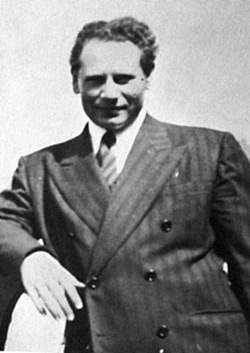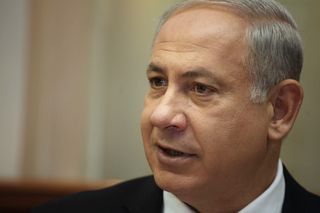
One of the more striking aspects of the pre-emptive strikes on Peter Beinart's tightly argued polemic, The Crisis Of Zionism, is not just their viciousness, but their avoidance of the core issue of the book:
Why continue to build the settlements?
Is it not clear by now that the settlements' existence and relentless expansion are turning liberal Zionism into "something much darker"? What justification is there for continuing to build them, to add to them, to keep increasing the Jewish population in an area that under any two-state solution, Israel would presumably have to give up? Only today, we read in Haaretz the following:
Civil Administration’s maps and figures, disclosed here for the first time, suggest the barrier route was planned in accordance with the available land in the West Bank, intended to increase the area and population of the settlements.
A total of 569 parcels of land were marked out, encompassing around 620,000 dunams (around 155,000 acres) − about 10 percent of the total area of the West Bank. Since the late 1990s, 23 of the unauthorized outposts were built on land included in the map. The Civil Administration is endeavoring to legalize some of these outposts, including Shvut Rahel, Rehelim and Hayovel.
Etkes believes this indicates the settlers who built the outposts had access to the administration’s research on available land − more proof of the government’s deep involvement in the systematic violation of the law in order to expand settlements, he says.
Let us be clear. The Israeli government is systematically taking and holding the land that could be the Palestinians' future state. They have been doing so for decades. The deliberate population of  occupied land violates the Geneva Conventions. The occupation itself enrages the Arab and Muslim world and creates a huge drag on the US's strategic need to build up allies among emerging Arab democracies, and defuse Jihadism across the globe.
occupied land violates the Geneva Conventions. The occupation itself enrages the Arab and Muslim world and creates a huge drag on the US's strategic need to build up allies among emerging Arab democracies, and defuse Jihadism across the globe.
And Peter's book is explicitly about this problem. It lies at the center of his argument. And yet it is all but ignored by his critics. The trope responses are varied in their weary familiarity. Let us examine them.
The Palestinians have for a long time been their own worst enemies, and in the past have not sought peace. It's more complicated than that, but sure, for much of the past sixty years, the Palestinians bear a huge responsibility for their own situation.
Why continue to build the settlements?
Iran's nuclear development is the most urgent issue.
Lets concede that for the sake of argument, but why continue to build the settlements?
China occupies Tibet and you don't fixate on that.
Well, I do oppose the occupation of Tibet and if my own taxpayers dollars were going directly to sustain that occupation, or to facilitate transfers of the Chinese population to Tibet to shift the demographic balance, I'd have an issue with that as well.
But why continue to build the settlements?
Obama made freezing the settlements a precondition for talks so it's his fault, the Greater Israel  lobby insists, that the two state solution is going nowhere. But when the issue at hand is a division of land, and when one side, which holds almost all the raw power, wants to keep taking parts of that land while it is simultaneously negotiating its division, it's an impossible negotiation. You don't negotiate while simultaneously adding facts on the ground to tilt the talks your way. You freeze the situation; you talk to the other side. That's all Obama asked for – just a freeze of construction for a year. Netanyahu refused. Even the ten-month alleged suspension made no measurable difference in the number of new homes built in the relevant year.
lobby insists, that the two state solution is going nowhere. But when the issue at hand is a division of land, and when one side, which holds almost all the raw power, wants to keep taking parts of that land while it is simultaneously negotiating its division, it's an impossible negotiation. You don't negotiate while simultaneously adding facts on the ground to tilt the talks your way. You freeze the situation; you talk to the other side. That's all Obama asked for – just a freeze of construction for a year. Netanyahu refused. Even the ten-month alleged suspension made no measurable difference in the number of new homes built in the relevant year.
So again: why continue to build the settlements?
And the reason for urgency is obvious: the faster the settlements grow in property, scale and population, the harder it will be to remove them. The longer a democracy occupies a foreign country and people, the more it risks the moral corruption of imperial control of another people's destiny, of dehumanizing those you fear, of fueling the hatred you then use to justify further violence and coercion. Peter Beinart's book is a simple restatement of this truth.
It cannot be restated enough.
And the evasions of this central point of Beinart's book by its vitriolic critics are as legion as they are predictable. And they matter. Because the evaders do not want to answer the question: why continue to build the settlements? They do not want to answer that question and dodge it relentlessly because the answer is obvious and devastating to their position.
 The answer is that the settlements are there because the current Israeli government has no intention of ever dividing the land between Arabs and Jews in a way that would give the Palestinians anything like their own state; and have every intention of holding Judea and Samaria for ever. Netanyahu is, as Beinart rightly calls him, a Monist. He is the son of his father, Ben Zion, as Jeffrey Goldberg has also insisted on. But what Peter does is spell out one side of the Netanyahu vision that Goldberg elides.
The answer is that the settlements are there because the current Israeli government has no intention of ever dividing the land between Arabs and Jews in a way that would give the Palestinians anything like their own state; and have every intention of holding Judea and Samaria for ever. Netanyahu is, as Beinart rightly calls him, a Monist. He is the son of his father, Ben Zion, as Jeffrey Goldberg has also insisted on. But what Peter does is spell out one side of the Netanyahu vision that Goldberg elides.
Vladimir Jabotinsky was a huge influence on Netanyahu's father and Netanyahu himself. He's a complicated figure, as Beinart readily concedes. For Jabotinsky, what it all came down to in the end was "the single ideal: a Jewish minority on both sides of the Jordan as a first step towards the establishment of the State, That is what we call 'monism'." My italics. The Revisionist Zionists (whence eventually Likud) envisaged a Jewish state that would not only include the West Bank but the East Bank as well, i.e. Jordan.
Ben Zion Netanyahu followed Jabotinsky's vision, and his willingness, even eagerness, to use violence to achieve it: "We should conquer any disputed territory in the land of Israel. Conquer and hold it, even if it brings us years of war … You don't return land." Ben Zion Netanyahu even favored the "transfer" of Arabs living in Palestine to other Arab countries. In 2009, Netanyahu Sr, put his position this way to Maariv:
"The Jews and the Arabs are like two goats faing each other on a narrow bridge. One must jump into the river." "What does the Arab's jump mean?" asked the interviewer, trying to decipher the metaphor. Netanyahu explained: "That they won't be able to face the war with us, which will include withholding food from Arab cities, preventing education, terminating electrical power and more. They won't be able to exist and they will run away from here."
Suddenly, the situation in Gaza and much of the West Bank makes more sense, doesn't it? It's a conscious relentless assault on the lives of Palestinians to immiserate them to such an extent that they flee. And if you do not think that Bibi Netanyahu's father isn't easily the biggest influence on his life and worldview, read Jeffrey Goldberg. Money quote:
“Always in the back of Bibi’s mind is Ben-Zion,” one of the prime minister’s friends told me. “He worries that his father will think he is weak.”
Ben Zion is a radical and a fanatic and an illiberal Zionist, who sees the world as for ever 1938, the Arabs as a monolithic group of barbarians, and foreswears any interaction with them except through force. You cannot understand the current Israeli government without grasping that it is led by the son of the man who said this, and who shares his worldview. "The Arabs know only force," Bibi has said. And here is the message from Ben Zion on Iran, as reported by Goldberg:
“From the Iranian side, we hear pledges that soon—in a matter of days, even—the Zionist movement will be put to an end and there will be no more Zionists in the world. One is supposed to conclude from this that the Jews of the Land of Israel will be annihilated, while the Jews of America, whose leaders refuse to pressure Iran, are being told in a hinted fashion that the annihilation of the Jews will not include them … The Jewish people are making their position clear and putting faith in their military power. The nation of Israel is showing the world today how a state should behave when it stands before an existential threat: by looking danger in the eye and calmly considering what should be done and what can be done. And to be ready to enter the fray at the moment there is a reasonable chance of success.”
The key phrases are "faith in military power" and "enter the fray." Diplomacy with enemies is not in this mindset. Nor is any consideration but the defense and expansion of Greater Israel – "conquer and hold it" – even at the expense of what Ben Zion has called "years of war." Am I attaching the view of this fascistic vision from father to son? Not according to Goldberg:
Many people in Likud Party circles have told me that those who discount Ben-Zion’s influence on his son do so at their peril. “This was the father giving his son history’s marching orders,” one of the attendees told me. “I watched Bibi while his father spoke. He was completely absorbed.”
The mindset that believes that Israel should in principle include all of Jersualem, all of the West Bank, and all of Jordan, that it must never, ever return lands it "conquered", that all Arabs are barbarians, incapable of negotiating with, is exactly the same mindset that sees an existential threat from Iran – "in a matter of days even" – even though Iran has not yet got the capacity to make a single nuclear bomb, and if it did, would be facing over 100 nuclear warheads coming back from  Israel and the annihiliation of most of its population. There's paranoia. And then there's irrationality.
Israel and the annihiliation of most of its population. There's paranoia. And then there's irrationality.
And this irrationality is intrinsic to the current Israeli government's intent to hold on to the West Bank for ever, restrict Palestinians (whose very nationhood is dismissed) into vast gated communities, where the gates exist to keep the inhabitants inside, and between which Israel effectively rules. The inhabitants of these "reservations" would have no vote in Israel itself. And they would occupy only a fraction of the West Bank. This is the best we can expect from a Netanyahu future. It is not the likeliest, which is the continued settlement and de facto annexation of the entire area (i.e. the last three years).
If I am wrong, and those remaining liberal Israelis who still believe in a democratic, pluralist Israel can find a way to remove the settlements and come to a 1967-based land-swap compromise, we may be able to view this Netanyahu-Lieberman era as a horrible period in a gradual path forward. But the one emotion I felt closing Peter's book was sadness. I don't think the data suggest that either a majority of Israelis or a majority of American Jews are prepared to challenge a policy of conquering and subjugating another people in this way. And Beinart's book is very persuasive in showing how the mere act of occupation – the way it sets up inherent distance between Jew and Arab, and constantly humiliates the Arab – is profoundly shifting Israeli culture in such a way as to make the younger generations even less likely to compromise with "the other" than the older ones.
Beinart's book has been attacked so mercilessly, in my view, because it clearly, methodically, even-handedly exposes the radical Zionism that threatens to eclipse Israeli democracy, corrupt Jewish ethics and threaten American interests across the globe. And the key proof of his case is the continued, relentless expansion of West Bank settlements, and the ethnic social engineering in East Jerusalem. And so I ask again of Beinart's criticism to answer the core question of the book:
Why continue to build the settlements?
(Photo: Israeli settlers walk along al-Shuhada street, past two of dozens of shuttered Palestinian owned shops daubed with the Jewish Star of David, on September 28, 2010, in the West Bank town of Hebron, after Palestinians were forced years ago to move out of the old quarter by the Israeli army to allow for the Jewish settlers to move securely in the area. A few hundred hardline Jewish settlers live under heavy Israeli military protection in the heart of the town of 160,000 mostly Muslim Palestinians. By Hazem Bader/AFP/Getty.)
(Portraits (from top down): Ze'ev Jabotinsky, Ben Zion Netanyahu, Avigdor Lieberman, Binyamin Netanyahu.)